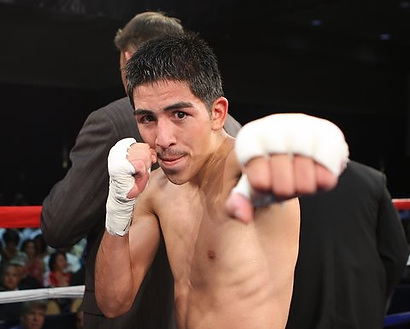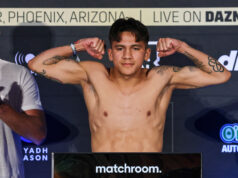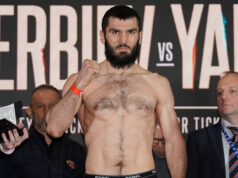By Bart Barry-

Saturday on ESPN in a PBC main event that happened at Staples Center, Leo Santa Cruz decisioned Abner Mares. The fight was heavy with volume and light with quality, as the fighters winged blows in a blur of shoulder striking, head clashing and guard peppering. It was not a great fight but easily the PBC’s greatest fight.
There was an immediate association that happened in my mind as the bell rang on Saturday’s main event – an association strained through the Battle of Los Angeles idiocy and fact nether Mares nor Santa Cruz is very good – and it was one of small Mexican pugilists plying their wares before a gritty, blue-collar-Mexican crowd in Southern California. Where did I feel this before? It was ringside in Carson, Calif., 7 1/2 years ago, when Israel Vazquez and Rafael Marquez made the third fight of what might be called a “natural trilogy” the way a natural hat trick happens when a hockey player scores three goals in a row without another puck from another stick going in the net; Vazquez and Marquez fought each other three times in 12 months, finishing their trilogy with their very best fight. Saturday’s match did not suffer the comparison gladly.
There is something second-rate about our sport now. There has not been a better or more justifiably anticipated main event broadcasted by the PBC yet, and yet. From the opening bell of a fight that felt more like 114-114 than 117-111, the scorecard two judges and the PBC’s Teddy Atlas happened to have, Mares demonstrated he was the fighter of greater range, while Santa Cruz proved he was taller. That was it, really. Santa Cruz, the telecast told our lying eyes, was much busier and more accurate, and yet it did not feel that way. Perhaps it was expectations rendering us victims yet again.
Years ago, if any PBC viewer remembers, Santa Cruz was our next Antonio Margarito. What Shane Mosley discovered about Margarito no one before him quite had was this: Margarito could not fight going backwards and wasn’t particularly astute, either, with an opponent on his chest, in his kitchen, smoking, as the late Joe Frazier perfectly had it, where he lived. Margarito had a crossover move, bringing his right foot along with his right hand along with his right foot, closing his opponent’s front shoulder, then opening him up with a fully leveraged left hook. One who waits for Santa Cruz to perform a similar feat of footwork will grow old with anticipation.
Santa Cruz is tall and busy. He might learn to do something with his right uppercut – a few more of those Saturday might’ve shortened Mares’ evening considerably – but he has not yet, and he has not improved at all, much as the PBC telecast assured us he has. Atlas, despite his dogged repetition of every insight six and seven times, detected immediately the bizarre habit Santa Cruz has of shaking his right hand like it’s broken. He telegraphs punches, somewhat, but expresses anxiety more so. It’s the sort of habit a fighter can form in the boredom of padwork or bagwork, and it’s not Santa Cruz’s fault. But where the hell are his trainers? Do they think it’s charming or marketable or a habit they might monetize like Canelo’s fiery coif?
Atlas’ insistence Mares should be doing something with Santa Cruz’s tell, though, was a bit misplaced. Santa Cruz still had his twitching hand in a position from which he might block a left hook, especially one hurled by a fighter having to cross as much terrain to his chin as Mares did. Mares used Santa Cruz’s nervousness properly; don’t get hit with the hand he’s shaking at me.
Mares fought a better match, altogether, than two judges believed. That Santa Cruz walked to the ring accompanied by the son of manager Al Haymon’s henchbuffoon indicated Mares would need a knockout to win, and Mares, to his credit, went looking for one, insisting from the opening second of the match Santa Cruz was not in his class as a fighter. That was true, yes, but Mares, at 126 pounds, is eight pounds from his best division, and he didn’t have a punch, left hook or righthand counter, that much as dented Santa Cruz.
Just because Mares can no longer make bantamweight by no means makes him a featherweight. But Mares was the gamer man Saturday. He fired back when fired upon, he reacted better to being struck, he did not retreat unless strategy, as opposed to doubt, mandated it. Mares was much better at 118, too, than Santa Cruz is at 126.
Which was still not that good. Mares won a close but fair decision over Vic Darchinyan three years after Nonito Donaire iced the Armenian and a year after Joseph Agbeko decisioned him. Darchinyan, past his prime and a weightclass or two too heavy, nevertheless gave Mares a stern test. Mares then sneaked past Agbeko, fouling him repeatedly, and when he won their rematch, and Showtime needed a house fighter from Golden Boy Promotions to anoint, Mares was launched as a shooting duper superstar. Which he was not fit to be. Soon enough, an ancient Jhonny Gonzalez put the lie to the Mares machine, and if Gonzalez’s left hand didn’t do it, Mares’ shameless avoidance of a rematch with the belligerent old Mexican sure has.
People boo Mares, and they’re right to, but thinking lowly of Mares does not, through some law of transitivity, consign one to opining highly of Santa Cruz. That’s the bad news. The worse news is, able now to abscond with a reputation, if not a particularly meaningful piece of WBA hardware, Santa Cruz has no incentive to do anything more than make semiannual PBC defenses of his new title, his skillset deteriorating steadily until the day Al Haymon signs Guillermo Rigondeaux and harsh reality, wearing dark Cuban knuckles, raps upon Santa Cruz’s hardly won Los Angeles door.
Bart Barry can be reached via Twitter @bartbarry









